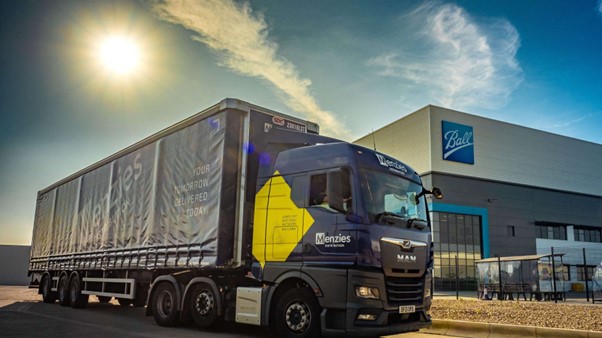Sustainability
Ball and Coca-Cola join forces to trial carbon-cutting trucks in the UK
December 08, 2023
Creating clear and credible pathways to achieving net zero is at the heart of Ball’s Climate Transition Plan. In the UK, Ball Beverage Packaging and Coca-Cola Europacific Partners (CCEP) have teamed up to reduce their combined carbon footprint by trialing hydrotreated vegetable oil (HVO) part-fueled trucks.
By the end of the trial period, Ball and CCEP expect to reduce their UK supply chain CO2e emissions by around 300 tons. If fully implemented, part-fueling trucks with HVO could reduce the carbon footprint from supply chain transportation — the delivery of finished cans to customers — by up to 90%.
As well as being renewable, HVO is both versatile and convenient — it can be used as a primary fuel source or combined with diesel and doesn’t require modification of vehicle engines or additional maintenance.
Combining fuels and sharing focus in the drive to net zero
Vehicles using HVO are an increasingly important part of the transportation network for the beverage industry across Europe, and Ball is already using them at its locations in France and Sweden. Ball is also developing future HVO projects across Spain, Italy, Austria and Switzerland.
In 2022 CCEP used alternative fuels in approximately 8% of the total kilometers driven by its logistics partners in Europe, and is making strides to increase usage of alternative fuels. CCEP currently uses hydrotreated vegetable oil (HVO100) in Great Britain, Germany, the Netherlands, Spain and Sweden.
CCEP is the world’s largest independent provider of containers for Coca-Cola and has an ambition to reach net zero emissions by 2040, and reduce GHG emissions across its entire value chain by 30% by 2030 (vs. 2019).
Similarly, Ball’s Climate Transition Plan outlines its pathway and evolution into a fully circular and decarbonized business to better serve stakeholders and deliver solutions that benefit the planet. Introducing HVO is an important step to achieving Ball’s decarbonization goals.
